Seven classic herbal teas can help you achieve better sleep naturally. Chamomile, known for its calming properties, is a go-to choice for many. Valerian root tea offers a potent solution for insomnia sufferers. Lavender's soothing aroma can relax your mind and body. Passionflower tea may reduce anxiety and promote restful nights. Lemon balm's calming effects can ease you into sleep. Magnolia bark, used in traditional Chinese medicine, can help manage nighttime stress. Finally, hops tea provides sedative effects beyond its use in beer. By exploring these time-honored brews, you'll discover a world of natural sleep aids waiting to be sipped.
Chamomile: Nature's Sleep Elixir
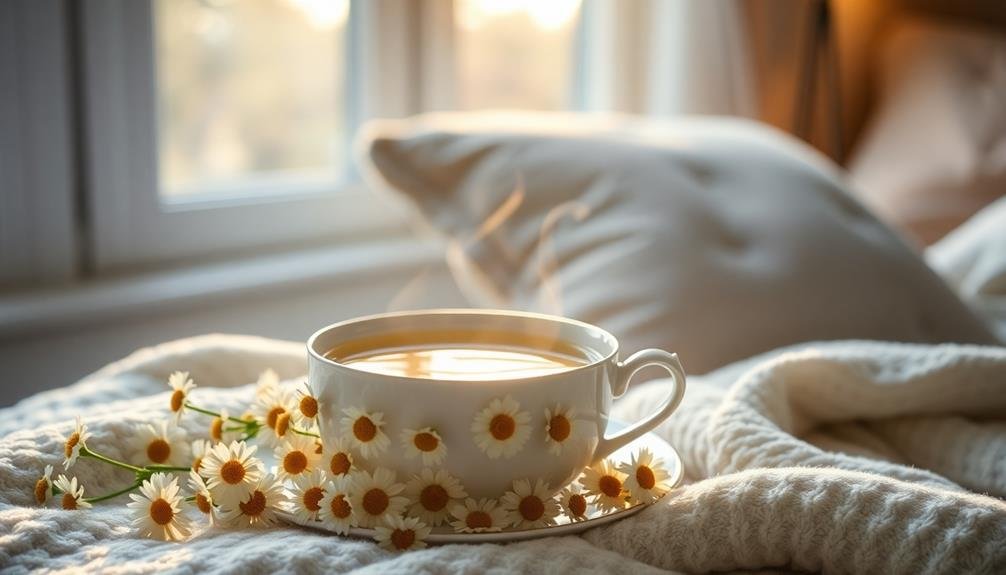
Known for its gentle, calming effects, chamomile tea has been used for centuries as a natural sleep aid. This golden-hued brew contains apigenin, an antioxidant that binds to specific receptors in your brain, potentially reducing anxiety and initiating sleep.
When you're struggling with insomnia or restlessness, a cup of chamomile tea before bed can help soothe your nerves and prepare your body for rest.
To brew the perfect cup, steep one chamomile tea bag or one tablespoon of dried chamomile flowers in hot water for 5-7 minutes. You can enhance its flavor and effectiveness by adding a touch of honey or a slice of lemon.
For maximum benefit, drink your chamomile tea about 30 minutes before bedtime.
While chamomile is generally safe for most people, it's crucial to understand that it may interact with certain medications or cause allergic reactions in individuals sensitive to plants in the daisy family.
If you're pregnant, nursing, or taking blood thinners, consult your healthcare provider before incorporating chamomile tea into your nightly routine.
Regular consumption of this herbal tea can contribute to improved sleep quality and duration, making it a valuable addition to your sleep hygiene practices.
Valerian Root Tea
For centuries, valerian root tea has been a go-to remedy for those struggling with sleep issues. This potent herb contains compounds that interact with your brain's GABA receptors, helping to calm your nervous system and promote relaxation.
When you brew valerian root tea, you'll notice its earthy, slightly pungent aroma. Don't let the strong smell deter you; its benefits far outweigh any initial olfactory discomfort.
To prepare, steep 1-2 teaspoons of dried valerian root in hot water for 10-15 minutes. It's best to drink this tea about an hour before bedtime to allow its effects to take hold.
You might experience improved sleep quality, reduced time to fall asleep, and fewer nighttime awakenings. Some people also report feeling more refreshed upon waking. However, be aware that valerian can cause vivid dreams in some individuals.
While generally safe, valerian root tea isn't recommended if you're pregnant, nursing, or taking certain medications. It's always wise to consult your healthcare provider before adding any new herbal remedy to your routine.
With consistent use, you may find valerian root tea to be a natural and effective solution for your sleep troubles.
Lavender's Calming Essence
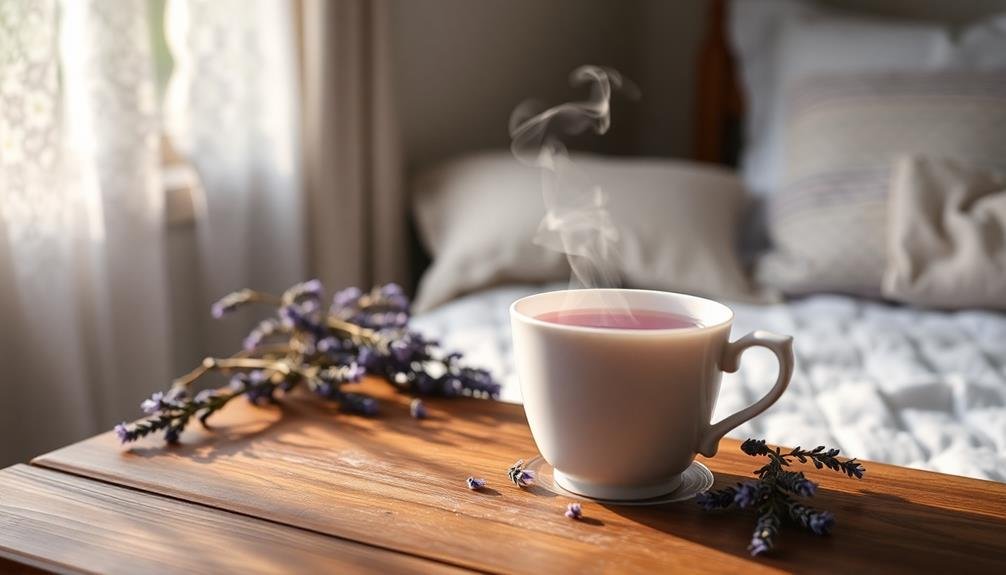
You'll find lavender's soothing aromatherapy benefits extend beyond its pleasant scent.
This fragrant herb acts as a natural anxiety reducer, helping to calm your mind and prepare your body for rest.
Soothing Aromatherapy Benefits
Beyond its soothing taste, lavender tea offers powerful aromatherapy benefits that can enhance your sleep quality. As you brew a cup, the gentle floral scent wafts through the air, signaling your brain to relax and prepare for rest. This olfactory experience triggers the release of calming neurotransmitters, helping to quiet racing thoughts and reduce anxiety.
You'll find that inhaling lavender's aroma while sipping the tea can lower your heart rate and blood pressure, promoting a state of tranquility. The scent molecules interact with your limbic system, influencing emotional responses and memory. This interaction can help create positive associations with bedtime rituals, making it easier to fall asleep over time.
To maximize these benefits, try steeping your lavender tea in a covered pot to trap the aromatic compounds. As you remove the lid, take a few deep breaths to fully absorb the calming essence.
You can also place a sachet of dried lavender near your pillow to continue the aromatherapy effects throughout the night, ensuring a more restful and rejuvenating sleep experience.
Natural Anxiety Reducer
Lavender's sleep-inducing properties extend far beyond its aromatic qualities. This versatile herb, when brewed into a tea, becomes a potent natural anxiety reducer. As you sip on lavender tea, you're not just enjoying a pleasant flavor; you're actively calming your nervous system.
The compounds in lavender, particularly linalool, interact with your brain's GABA receptors, promoting relaxation and reducing stress. This effect can considerably ease your mind before bedtime, helping you shed the day's worries and prepare for restful sleep.
You'll find that regular consumption of lavender tea can lead to improved sleep quality over time. It's not just about falling asleep faster; it's about achieving deeper, more restorative sleep cycles. The herb's mild sedative effects can help you stay asleep longer and wake up feeling more refreshed.
For best results, brew your lavender tea about an hour before bed. This timing allows the calming compounds to take effect as you're winding down.
Sleep Quality Enhancer
The calming essence of lavender tea goes beyond merely helping you fall asleep; it actively enhances your overall sleep quality. When you sip this fragrant brew before bedtime, you're setting the stage for a more restful night. Lavender contains linalool, a compound known for its sedative properties, which can help you achieve deeper, more restorative sleep cycles.
You'll likely find that lavender tea reduces nighttime awakenings, allowing you to sleep more continuously throughout the night. This uninterrupted sleep is vital for your body's repair processes and cognitive function.
Additionally, lavender's anxiolytic effects can quiet racing thoughts, making it easier for you to relax and shift into sleep. Regular consumption of lavender tea may also improve your sleep efficiency, meaning you'll spend more of your time in bed actually sleeping.
This can lead to feeling more refreshed and energized upon waking. Remember, better sleep quality isn't just about quantity; it's about the depth and consistency of your rest.
Passionflower for Restful Nights
Passionflower tea has gained popularity among those seeking a natural solution to sleep troubles. This herbal remedy is derived from the Passiflora incarnata plant, known for its calming properties. Research suggests that passionflower may help reduce anxiety and improve sleep quality by increasing levels of gamma-aminobutyric acid (GABA) in the brain.
To make passionflower tea, you'll need to steep 1-2 teaspoons of dried passionflower in hot water for 5-10 minutes. It's best consumed 30-60 minutes before bedtime to allow its effects to take hold. While generally considered safe, you should consult your healthcare provider before using passionflower, especially if you're pregnant, nursing, or taking medications.
| Benefit | Description |
|---|---|
| Anxiety reduction | May help calm racing thoughts |
| Sleep onset | Can shorten time to fall asleep |
| Sleep quality | May improve overall sleep depth |
| Muscle relaxation | Promotes physical relaxation |
Regular consumption of passionflower tea might lead to improved sleep patterns over time. However, it's important to combine this natural remedy with good sleep hygiene practices for best results. Remember, while herbal teas can be beneficial, they're not a substitute for addressing underlying sleep disorders or medical conditions.
Lemon Balm's Soothing Properties
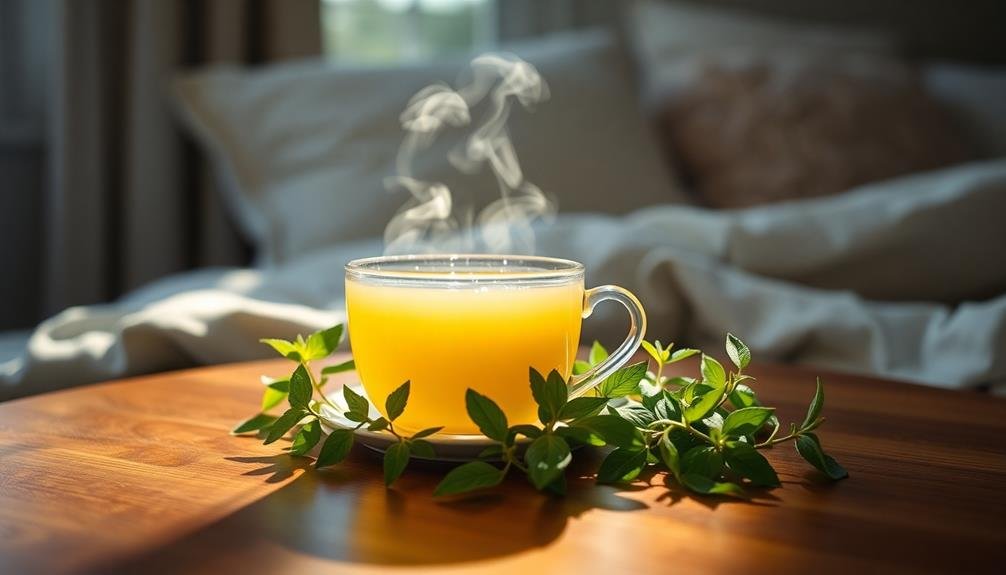
Lemon balm tea can be a powerful ally in your quest for better sleep.
You'll find this herb particularly effective at calming anxiety, which often interferes with restful slumber.
Calming Effects on Anxiety
Among the many herbal teas known for promoting better sleep, lemon balm stands out for its remarkable calming effects on anxiety. This herb has been used for centuries to soothe nerves and reduce stress. When you're feeling overwhelmed or restless, a cup of lemon balm tea can help you relax and unwind.
Lemon balm works by increasing the levels of GABA, a neurotransmitter that promotes relaxation, in your brain. It also helps to lower cortisol, the stress hormone that can keep you awake at night. By incorporating lemon balm tea into your evening routine, you'll likely notice a significant reduction in anxiety symptoms and improved sleep quality.
Here's a quick guide to lemon balm's effects on anxiety:
| Symptom | Effect |
|---|---|
| Restlessness | Reduces |
| Racing thoughts | Calms |
| Muscle tension | Relaxes |
| Heart rate | Stabilizes |
| Overall stress | Decreases |
To maximize lemon balm's benefits, steep 1-2 teaspoons of dried leaves in hot water for 5-10 minutes. You can enjoy this tea 30 minutes before bedtime to help you shift into a peaceful sleep state. Remember, consistency is key when using herbal remedies, so make lemon balm tea a regular part of your nighttime routine for best results.
Improving Sleep Quality
While lemon balm's anxiety-reducing effects are impressive, its ability to improve sleep quality is equally significant. When you consume lemon balm tea before bedtime, you're likely to experience a more restful night's sleep. This herb contains compounds that interact with GABA receptors in your brain, promoting relaxation and reducing insomnia symptoms.
Lemon balm can help you fall asleep faster and stay asleep longer. It's particularly effective in combating sleep disturbances caused by stress or anxiety. By drinking this tea, you'll notice a decrease in nighttime awakenings and an overall improvement in sleep efficiency.
The herb's mild sedative properties don't leave you feeling groggy the next day, unlike some sleep medications. Instead, you'll wake up feeling refreshed and rejuvenated. Lemon balm tea can also enhance your sleep quality by reducing muscle tension and promoting physical relaxation.
To maximize its sleep-improving benefits, try drinking a cup of lemon balm tea about an hour before bedtime. You can also combine it with other sleep-promoting herbs like chamomile or valerian root for a more potent effect.
Magnolia Bark's Ancient Wisdom
For centuries, magnolia bark has been a revered ingredient in traditional Chinese medicine. Its use as a sleep aid dates back thousands of years, with ancient healers recognizing its potent calming properties.
Today, you can harness this ancient wisdom by incorporating magnolia bark tea into your bedtime routine. Magnolia bark contains compounds called honokiol and magnolol, which interact with your brain's GABA receptors. These receptors play an essential role in regulating sleep and reducing anxiety. By enhancing GABA activity, magnolia bark can help you relax and fall asleep more easily.
You'll find that this herbal tea not only promotes better sleep but also helps manage stress and anxiety. It's particularly effective if you're dealing with racing thoughts or tension that keep you awake at night.
To prepare the tea, steep 1-2 teaspoons of dried magnolia bark in hot water for 10-15 minutes. You can drink it about an hour before bedtime to experience its full benefits.
While generally safe, it's wise to consult your healthcare provider before adding magnolia bark tea to your routine, especially if you're pregnant, nursing, or taking medications.
Hops: More Than Beer
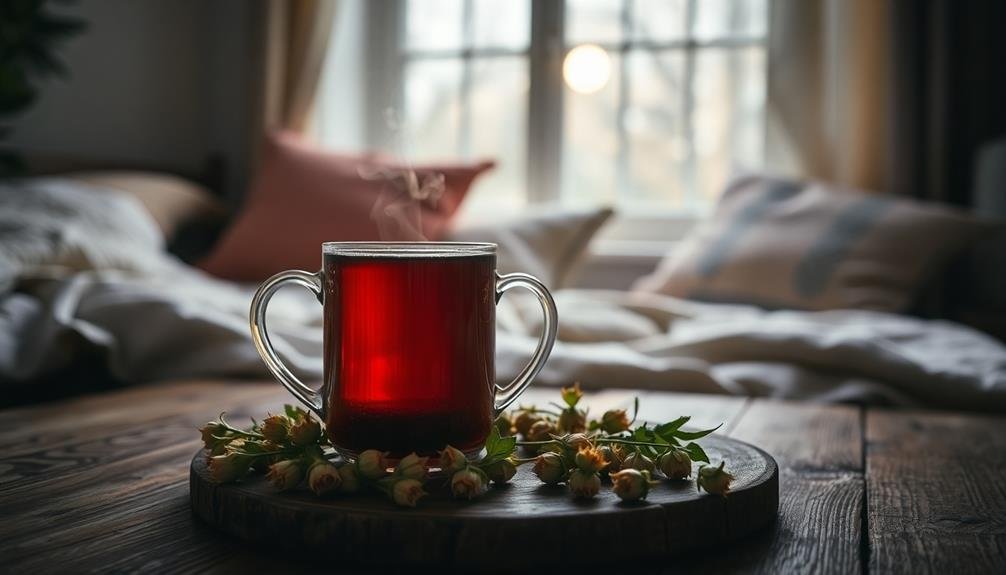
Hops aren't just for brewing beer—they're also a powerful sleep aid. These cone-shaped flowers have been used for centuries to promote relaxation and improve sleep quality. The secret lies in their sedative compounds, particularly a substance called methylbutenol.
When you consume hops, either as a tea or supplement, you'll likely experience a calming effect that can help you fall asleep faster and stay asleep longer. Studies have shown that hops can increase gamma-aminobutyric acid (GABA) levels in your brain, a neurotransmitter that reduces nervous system activity and promotes relaxation.
You'll find hops particularly effective when combined with valerian root, another well-known sleep aid. This synergistic effect can enhance overall sleep quality and reduce the time it takes to fall asleep. If you're struggling with insomnia or restlessness, try incorporating hops into your bedtime routine.
To make hops tea, steep 1-2 teaspoons of dried hops in hot water for 10-15 minutes. You can also find hops in supplement form or as an essential oil for aromatherapy.
Frequently Asked Questions
Can Herbal Teas Interact With Sleep Medications or Other Drugs?
Yes, herbal teas can interact with sleep medications and other drugs. You should always consult your doctor before combining them. Some herbs may enhance or reduce the effects of medications, potentially causing unwanted side effects or reduced efficacy.
How Long Before Bedtime Should I Drink These Teas?
You should drink these teas about 30-60 minutes before bedtime. This gives your body time to absorb the calming compounds and allows you to use the bathroom if needed before sleep. Don't consume them too late.
Are These Herbal Teas Safe for Pregnant or Breastfeeding Women?
You should be cautious with herbal teas during pregnancy and breastfeeding. Some herbs can affect your baby or hormones. Always consult your healthcare provider before consuming any herbal teas while pregnant or nursing.
Can Children Drink These Sleep-Promoting Herbal Teas?
You shouldn't give sleep-promoting herbal teas to children without consulting a pediatrician first. Some herbs can be too strong for kids and may cause side effects. It's best to explore safer sleep solutions for children.
How Often Can I Drink These Teas Without Developing Tolerance?
You can safely drink sleep-promoting herbal teas daily without developing tolerance. However, it's best to vary your routine. Try alternating between different teas and don't rely solely on them for better sleep. Maintain good sleep hygiene too.
In Summary
You've now discovered seven powerful herbal allies for better sleep. Whether you're struggling with insomnia or just want to improve your nightly rest, these teas offer natural solutions. Don't hesitate to experiment and find your perfect bedtime brew. Remember, consistency is key. Make these teas part of your nightly routine, and you'll likely notice improved sleep quality over time. Sweet dreams await you with nature's sleep-inducing remedies at your fingertips.

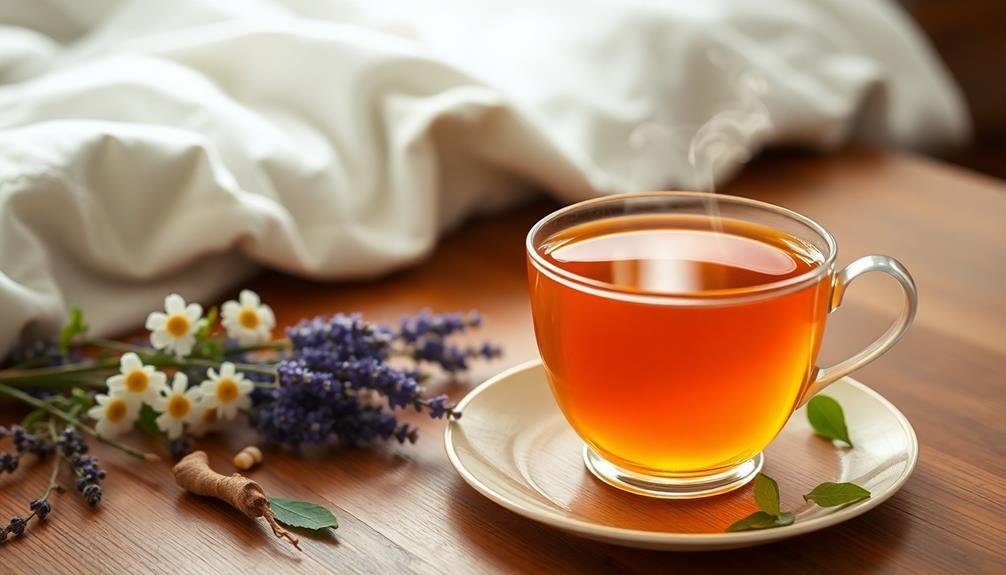
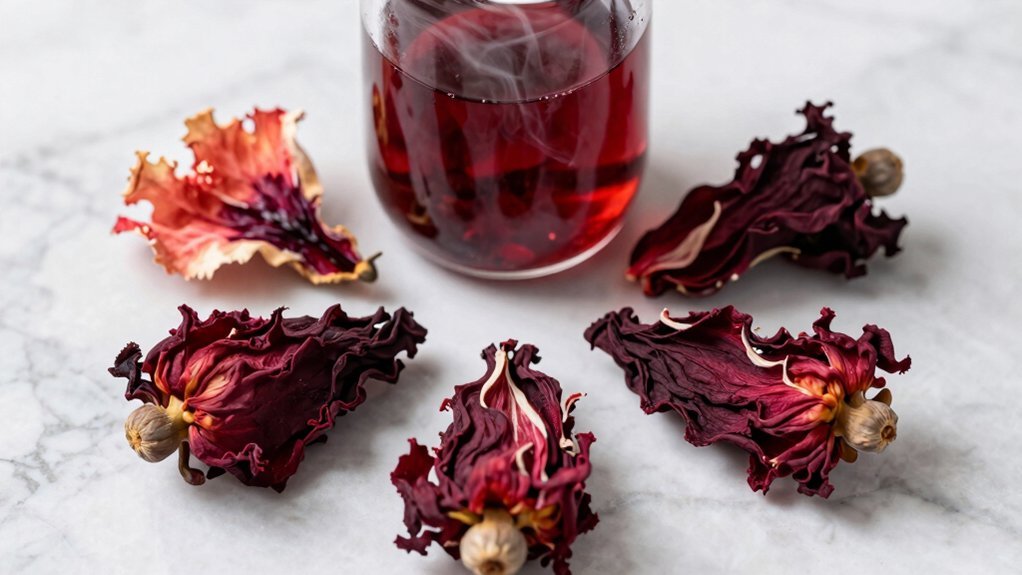


Leave a Reply